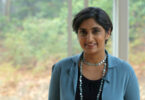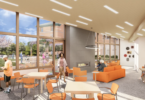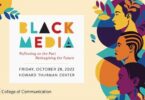
From left to right, members of the LGBTQ+ Commission, John Barnert, Jessica Daniels, Rachel Oppenheimer, and Aren Stone have a discussion at the LGBTQ+ Commission meeting Thursday, Nov. 15, 2018, in Cambridge, Mass. Photo by YasmineGhanem /BU News Service.
By Yasmine Ghanem
BU News Service
CAMBRIDGE — All-gender bathrooms, and Public Accommodations Law trainings were a few main points of discussion at the LGBTQ+ Commission’s final meeting of the year on Thursday night, Nov. 14.
Founded in February 2004, the all-volunteer commission meets every fourth week of most months. Meetings are open and the public is welcome.
All-Gender Bathrooms and Trainings
All-gender bathrooms for establishments in Cambridge is one of the commission’s most important goals. That was the topic first broached by John Gintell, co-chair of the commission, and member of the all-gender bathroom committee.
Gintell said the city aims to create an all-gender bathroom in City Hall and the City Hall Annex, but to date, only one of four bathrooms in the Annex is all-gender.
None of City Hall’s four public restrooms or the two private, single-stall bathrooms, are all-gender, even though a 2012 measure calls for all city-owned buildings that have single stall bathrooms to assure that “at least one or more” be designated as “unisex” if plumbing and building code allow for those changes.
Gintell also noted the commission has been trying to encourage all city establishments to assure it has an all-gender bathroom through voluntary trainings, an ongoing effort since the law passed in 2012.
Commissioner Maya Escobar suggested a promotional video from establishments that already have the all-gender bathrooms might be a way to convince others to make the change as well.
“Something like, ‘This is how it’s worked and it’s totally fine. You go in the bathroom, you come out of the bathroom, you go back to your seat’,” she laughed along with other members.
Additionally, the commission is teaming up with the Cambridge Human Rights Commission (CHRC) to do trainings for establishments and organizations licensed by the city, such as restaurants and bars, but there have not been any yet, according to Nancy Schlacter, the executive director of the CHRC, even though last fall, commission members said they hoped to do trainings in early 2018.
Schlacter said plans were put on hold after Question 3, regarding transgender rights, was placed on the ballot, but now, the City Hall law department would begin to review the process again.
“It’s back on the front-burner again,” she confirmed.
The commission also revisited the idea the city create an ordinance requiring establishments to have single bathrooms relabeled as all-gender bathrooms, citing an ordinance from Seattle and Philadelphia, both enacted in 2016.
Police Subcommittee
The police subcommittee reported on its latest meeting with Police Commissioner Branville G. Bard Jr. (who was not present). The subcommittee serves as a point of contact between the full Commission and the police department.
Commissioner Jessica Daniels emphasized Bard is invested in making sure the police department has a good relationship with the commission. He became the liaison for the LGBTQ+ Commission automatically when he was selected as Commissioner at the Cambridge Police Department in August 2017.
Co-chair Aren Stone said Bard talked a lot about marginalized communities, and he does have an understanding of these communities and the relationship with the police and of the issues.
The group also discussed a training program known as GOAL, which was originally reserved for Cambridge police recruits and which now extends to all Lowell Police Academy recruits. The Gay Officers Action League, a nation-wide organization, provides sessions for non-LGBTQ+ officers and personnel with attention to staff sensitivity and community relations.
Bard said he is working to get officers on board with the trainings.
“It has not been an easy task, but that’s one of the reasons why he was hired,” Stone said.
One of Bard’s other endeavors is to assure for more diverse recruiting.
Cambridge Police spokesman Jeremy Warnick, confirmed after the meeting there is a cadet program for 18- to 23-year-olds in the works, and the CPD is trying to do outreach and recruit more diverse candidates, including members of the LGBTQ+ community.
“It’s more the strategy and thinking: ‘Who are the types of audiences we want to reach, and who are the appropriate organizations we can work with?’” he said.
Warnick said the police department acknowledges the importance of reaching diverse audiences for programs and working with certain commissions and organizations can help the department achieve that.
“We can’t do this alone,” he said.
Commissioner Outreach
The commission is looking for three new commissioners who would be interested in joining and starting by its next meeting on January 24, 2019.
To become a commissioner, an applicant must live or work in Cambridge and go through an application and interview process. In the interview, current members will ask about applicant interest and experience with LGBTQ+ community.
Ultimately, the city manager, Louis DePasquale, chooses new commissioners based on the commission’s recommendations.




